- Home
- Jeff Mariotte
Blood Quantum Page 9
Blood Quantum Read online
Page 9
She kneaded her hands together. "Against anything related to him. His lifestyle, his policies, everything. I mean, a few people on the rez have plenty of money, but most of us don't. He always seemed to represent the ones who do, and he ignored the rest of us."
"Okay," Brass said. "I guess that makes him a politician. Par for the course. That still doesn't explain -"
"I'm getting to that! I wanted to see if the things they said about him were true, about his houses and his spending and all that. So I watched him for a while. When I heard he was going to Fracas, I dressed up and went there, arranged to meet him."
"A little face time with a constituent. What happened then?"
"And I guess it was all true. He dropped, like, a grand or something, buying drinks for people. Champagne and whatnot. I played nice, you know, stroking his thigh and purring like some damn cat, and he thought he was going to score with me. He sent the others away and paid attention to me for a while, you know, telling me how pretty I am and all. He thought he was pretty smooth. I left with him, got into his Caddy, and then while he was driving, I just laid into him. I went off about his spending our money. Grey Rock money, on women and strangers and whatever, about his car and his houses and how he was always ignoring the little people. You should have seen how fast his attitude changed. All of a sudden, he knew he wasn't getting any, and he got pissed off. I was a spy, he said. Wanted to know who I was working for. I told him no one, everyone, the whole tribe. He was stealing our money, and he needed to stop it."
"I don't imagine he liked that," Brass said. Her brown skin had flushed as she relived her anger. She let out a deep breath, trying to cool down a bit. "Not at all. He stopped the car and told me to get out. We had only gone a few blocks. This was close to the Strip, you know, over near where Fracas is on Sahara. There was this construction site where he put me out, so before he drove away, I grabbed a brick off the ground and threw it at the car. It went right through the side window."
"So we've seen," Brass admitted.
"He yelled something at me and drove away. That was the last I seen him. He was alive then."
"So you never saw his house. The one in town."
"Hell no," she declared. "I walked back to the club, got in my junker, and drove home. Breaking his window was good enough for me. I didn't even expect to do that, but I didn't like the way he was talking to me."
"Did you call anybody on your way home. Karina?" Aguirre asked. "Is anyone able to back up your story?"
"I didn't call anyone," she replied. "I just came home. My mom can tell you what time I got in. She knew I was pissed, too, but I didn't tell her about Domingo." She glanced at the closed interior door, which Nick could tell wasn't much thicker than a sheet of paper. "I guess she knows now."
"Okay, Karina," Brass said. "Tell you what, we'll keep looking into this. You stay close to home in case we need to talk again, all right?"
"Yeah," she said. She looked relieved somehow, as if she had been wanting to tell her story to somebody but didn't know who. "Yeah, I'll be right here."
"One more thing. Miss Ochoa," Nick said. "I need to collect the clothes you wore last night."
"To the club?"
"That's right."
"They're in my room, in the hamper."
"Can you get them, please?"
Aguirre nodded again, and she left the room. The three police officers waited silently until she came back carrying a bundle of black clothing. Nick unfolded a big paper bag and put the bundle in. "Thank you," he said.
Whoever had killed Domingo should have been covered in blood. Nick hadn't smelled any when she handed him the clothes, just perfume and sweat.
"Thanks, Miss Ochoa," Brass said, standing up. "Either we or Officer Aguirre here will be in touch soon."
"See how I can barely contain my excitement?" she said. She shot Aguirre a look as if she considered him a traitor, and the three cops went out the front door.
"See what I mean?" Aguirre asked when he was back behind the wheel. Nick was in the back again, with Karina's clothing on the empty seat beside him.
"What? I saw an angry young woman who didn't think twice before throwing a brick through a man's car window," Brass said.
"But she's no murderer," Aguirre countered. "She destroyed property, and even that's rare for her. She had to be pushed hard to get to that point. Karina's not a firebrand, not any kind of real troublemaker. She's had a few run-ins with us, but always minor beefs, trespassing because she's carrying a picket sign on private property, that kind of thing. Maybe a couple of drunk-and-disorderlies, at parties and the like."
"Well, Nick here will check out her clothes, and if we find any traces of her presence in the house, then we'll have to have another conversation."
"Understood."
"In the meantime," Brass said, "is there anyplace to grab a late breakfast around here? I'm starving."
10
The Western Las Vegas University campus still felt like home. Ray knew every walkway, every window, every landscaped planter, all of it as familiar as if he had never left. Even the call of a mockingbird that roosted in a tree in one of the landscaped areas sounded like a hail from an old friend. Sunshine filtered through the trees and cast mottled shadows on concrete walkways.
Only a few students were around this early, most of them wearing jeans, backpacks slung over one shoulder. They hurried to classes or lounged on wooden benches. Couples held hands and leaned their heads together. A few people clutched paper to-go coffee cups as if they held the elixir of life itself.
Ray guessed that whenever he got around to retiring, the campus might, in his memory, be his favorite workplace. The crime lab was endlessly fascinating, with new challenges every day and interesting people to work with. At the hospital, he had felt fulfilled by the prospect of saving lives and helping the sick and distraught at every patient he lost. But as a university professor, he had the satisfaction of helping to mold young minds, to instill in people an early love of learning that they would carry with them the rest of their lives. Students loved to challenge their professors, to test their intellectual wings, to throw off the tethers of old ideas, so he was constantly being confronted, and the intellectual stimulation that provided kept him forever engaged and excited. In the campus environment, he could count on each day bringing at least one student who was convinced that Ray knew nothing of the world, and that kind of adventure was worth its weight in dead bodies and ninhydrin.
But his new life, his new career, came with a certain amount of adventure of its own. On campus, he didn't usually have guns pointed at him or have the opportunity to put murderers in prison. The guns he could do without, but the knowledge that every shift he worked left the world a little safer was hard to beat.
Still, walking across campus sent a blade of nostalgia right through his heart, and it brought with it an undeniable longing for times gone by. He couldn't split himself in three, though: one to work at the hospital, one to teach, and one to perform crime-scene investigation. Failing that, he had to take one job at a time, and for now, he was a CSI.
Ray went into the history department's building, stepping into the cool hush of an air-conditioned hallway, and headed toward an office he had visited many times. He was looking for Keith Hyatt, who taught American history with an emphasis on the Western United States and Native American issues, and whose wife Ysabel was Grey Rock Paiute. Not only did he hope for some explanation of what "Quantum" might mean in relation to the late Chairman Domingo, but he also hoped that Keith could offer some insight into any other tribal issues that might have led to murder. Domingo's slaying wasn't necessarily connected to his role as chairman – it might have been a simple break-in gone bad – but the possibility couldn't be discounted.
Ray couldn't remember Keith's office hours, but the door was open, so he tapped twice and went in. Keith's side of the office was as neat as ever. Keith, he had often thought, was not really cut out to be a university professor, because Ray had ne
ver seen another one who kept his office so tidy, every book in its place in the bookcase, student papers in crisp manila folders, pens and pencils contained in a made-in-China "Indian" vase a student had given him once as a gag. He had never looked inside Keith's filing cabinet, but he suspected it would be every bit as orderly.
That side of the office was as shipshape as always, but Keith himself wasn't there. On the office's sloppy side – Keith and his office mate, Brandon Romero, were sometimes called the Odd Couple of WLVU – Brandon sat, engrossed in a paper, red pencil in his right hand. From the amount of red Ray could see, the paper's author would not be getting a very good grade. "If you're looking for Keith, he's not here," Brandon said without looking up.
"Well, I was, in fact," Ray said. "But how are you, Brandon?"
At that, Brandon lowered the paper and raised his head. "Ray! It's good to see you."
"You, too. Everything going okay?"
"For me, yeah. I mean, you know, students being what they are and everything." He rattled the paper in his hand. There was a pile of similar papers on his desk, along with several books, other sheets of paper, pens and pencils, a computer, a paintbrush, a rubber monkey's head in a net bag, what appeared to be six marbles, and a telephone only partially visible beneath it all. "What do you do when someone tries to argue that rural electrification was a cause of the Civil War?"
"Send them back to high school?" Ray offered. "Or junior high?"
"Would if I could."
"On the other hand, sometimes students with outlandish ideas also come up with some of the best insights."
Ray was thinking specifically of a student's essay Keith had told them both about, which had prompted a lively lunch-hour debate about whether or not the surrender of Geronimo to the United States Army had been a net positive or negative for native peoples. The student had argued that if he had remained free, Geronimo might have been able to lead a revolution that could have resulted in a separate native home land within what was now the U.S.-Mexico border region. The three professors had discounted that idea but taken different sides on the overall question. Ray had believed that since the white population wasn't going anywhere and the reservation system was already established, achieving a lasting peace was a necessary step toward some workable reconciliation. Keith had argued that Geronimo was most valuable as a symbol of freedom and that he should have tried to remain free no matter what. Brandon 's theory had been closest to that of the student: that Geronimo should have kept up his raiding, trying to achieve concessions that would have bettered the lives of the reservation Indians as long as he could. They had achieved no certain outcome, but the conversation had been loud and lively.
"That's true," Brandon said. "And it's always fun to be surprised." He put the paper down on the stack of similar ones. "Like I said, Keith's not here. You know about Ysabel, right?"
"Is there something new?"
Brandon turned the red pencil in his hands. "She's taken a turn for the worse. Keith's at home with her. He's still hoping she'll pull out, but…" He shrugged.
"I'm sorry to hear that." Ysabel Hyatt had been fighting lung cancer, and the last Ray heard, she had been doing well. He felt sorry for Keith and Ysabel, and the knowledge that his new responsibilities at the crime lab had kept him out of the loop where old friends were concerned gave him a searing ache high up in his chest.
"Is there anything I can help you with. Ray?"
Ray considered the question, but the things he needed enlightenment on were really in Keith's area of expertise, not Brandon 's. "No, that's all right.'
"I'm sure Keith and Ysabel would love to see you. They're up and about. I've already talked to Keith twice today."
"Maybe I'll drop by," Ray said.
"You should. It'd do her a world of good."
"Thanks, Brandon. I hope you don't have to flunk too many students today."
Brandon picked up the paper again, his gaze already landing where he had left off. "Someone's got to. Someone should have done it a long time ago."
*
Keith and Ysabel Hyatt lived in a comfortable house in a long-established neighborhood, with tall palms offering some shade against the desert sun, actual grass lawns around some of the houses – although the city was working to phase those out – and neighbors who knew one another. The house had two stories, real wood siding painted a soothing periwinkle, a pitched slate roof, and contrasting dark red shutters. It reminded Ray of an East Coast beach house. He had always liked coming there, and the Hyatts had loved entertaining, holding regular barbecues, faculty mixers, and dinner parties featuring fascinating conversation and great food.
Ray parked on the brick-paved driveway, and by the time he reached the door, Keith was there opening it for him. He greeted Ray with a broad smile and a firm hug. "Come on in, man," Keith said when he finally released Ray. "Ysabel will be so happy to see you."
"How is she, Keith?"
"She's good." Keith glanced away, and Ray thought he saw moisture glint in his old friend's eyes. "You know, not good. But considering. She's in fine spirits."
"She's a strong lady," Ray said. "Always has been."
"Stronger than me, that's for sure." Keith dabbed at his eyes. "I would have given up years ago."
"I don't know about that."
Keith opened the front door and led Ray inside. "Ysabel, we've got company!" he called. Ray understood that he was giving his wife fair warning. The life of a cancer patient was not easy, and if Brandon Romero's report had been correct, she might need a couple of minutes to steel herself for guests.
"We turned the den into a bedroom for her," Keith said. He was a silver-haired man, lean and professorial. Even here in his own home, he was wearing a blue Oxford shirt and a vest, a natty navy blue with gold and red alternating pinstripes, over khaki pants. On his feet were deck shoes, worn without socks, giving extra credence to the idea that he'd have been happier on the coast at Nantucket or Martha's Vineyard. "Easier than having to climb the stairs. Not that she can't – still does, probably a couple times a day. I guess I'm just overprotective."
"There's nothing wrong with that, my friend. She's worth protecting."
Keith took him through the dining room, where Ray had met more interesting people than he could count. A door led from there into a short hallway, then to the kitchen and then the den. As they neared it. Ray caught what he thought of as hospital smells, disinfectant and medicine. He tried to brace himself. It had been months since he had seen Ysabel.
She was sitting up in bed, weaving one of the traditional baskets for which she had become locally famous. Spread out on the bed was her traditional toolkit, with a couple of cactus-spine awls that were rolled up into a yucca carrier and tied with cord. For years, she had exhibited at Indian fairs and powwows across the West, and now her baskets were in museums in Santa Fe, Phoenix, Denver, and Las Vegas. Her once thick, lustrous hair was short and thinned out, and her complexion was sallow, but she looked delighted to see Ray. The troubling thing was that her smile did not bring to her eyes the crystal brightness it once had, and that lack shot a bolt of ineffable sadness through Ray's heart. "Come here and give me a kiss, stranger!" she demanded. "I'd hug you, but I got this basket all over my lap."
"Not a problem," he said. He went to her bedside, clasped her offered hand, and kissed her cheek. Her skin had always been the softest of anyone he had ever known, and that remained true. She wore a cotton nightgown containing all the colors of a desert sunset. "I'm sorry it's been so long, Ysabel."
"You've been busy fighting crime," Keith said. "We try to keep up with the news."
"How is that going?" Ysabel asked. Her voice rose at the end of the question, more than most peoples' would; it always made her sound as if she was singing.
"It's good," Ray admitted. "It's hard work, but I feel it's worthwhile."
"I'm sure it is," she said. "You're making the world a better place. Of course, you always did that."
Not as much as you, Ra
y thought. Her presence in the world was like a beacon of life, a message of joy. People who bought her baskets without meeting her acquired things of beauty, but those who had the chance to get to know her acquired a knowledge that true goodness really existed. Or so he had always believed.
"I would think your years dealing with college students would be good preparation for handling hardened criminals," Keith put in, smiling as he said it.
"Generally, the people I deal with are already deceased," Ray replied. "But I remember a few students that might have been true of as well, at least judging by their participation in the class."
He chatted with them both for a few minutes, until Keith suggested that Ysabel was getting tired. She denied it, but Ray allowed Keith to lead him out of her room and back through the entryway to the couple's living room. The furniture there was worn and comfortable, arranged for easy conversation. A bookcase held well-thumbed volumes, and posters advertising powwows and old rock concerts decorated the walls. They weren't prints, Ray knew, but originals. He had always been especially impressed by a Mouse and Kelly poster featuring a blue and red Day-Glo Native American holding a pipe, its colors almost as crisp and vibrant as the day it was printed. The Hyatts had hung it in a position of honor above the fireplace. The concert was an appearance by the Youngbloods, the Sparrows, and the Sons of Champlin at San Francisco's Avalon Ballroom in 1966.
"She's a great lady, Keith," Ray said, admiring the poster.
"She sure is. She has the energy of a racehorse. Honestly, I'm sure she would have wanted to visit with you for hours, but it would wear me out."
"You've been under a lot of stress, Keith."
"And not sleeping as well as I should, I'm afraid."
"That's hardly surprising."
"Tell her. She thinks I should be taking all this in stride. It's just another part of life, she says." Keith sat down in the chair that had been his as long as Ray could remember, dark brown leather, worn on the arms. Ray took a seat on a sofa opposite him.

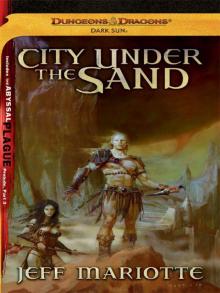 City Under the Sand
City Under the Sand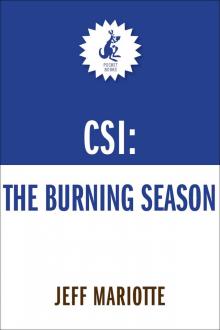 The Burning Season
The Burning Season Sanctuary
Sanctuary Winds of the Wild Sea
Winds of the Wild Sea Serpents in the Garden
Serpents in the Garden Close to the Ground
Close to the Ground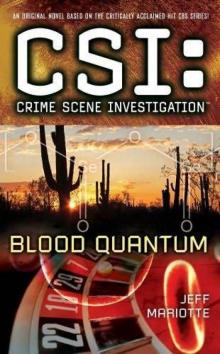 Blood Quantum
Blood Quantum Brass in Pocket
Brass in Pocket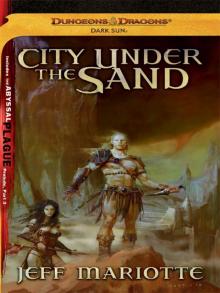 City Under the Sand: A Dark Sun Novel (Dungeons & Dragons: Dark Sun)
City Under the Sand: A Dark Sun Novel (Dungeons & Dragons: Dark Sun)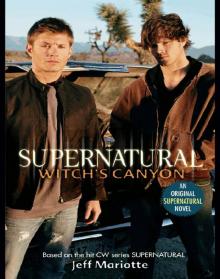 Witch's Canyon
Witch's Canyon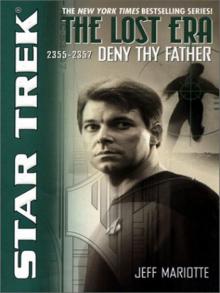 STAR TREK: The Lost Era - 2355-2357 - Deny Thy Father
STAR TREK: The Lost Era - 2355-2357 - Deny Thy Father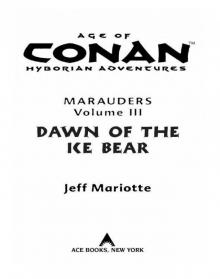 Dawn of the Ice Bear
Dawn of the Ice Bear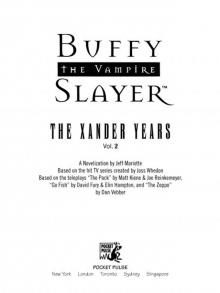 The Xander Years, Vol.2
The Xander Years, Vol.2 Ghost of the Wall
Ghost of the Wall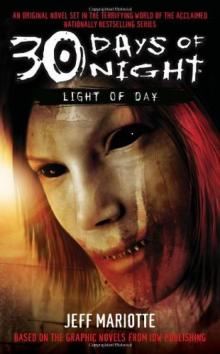 30 Days of Night: Light of Day
30 Days of Night: Light of Day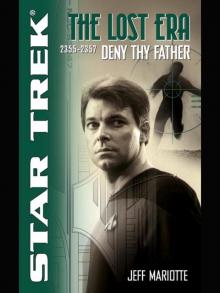 Deny Thy Father
Deny Thy Father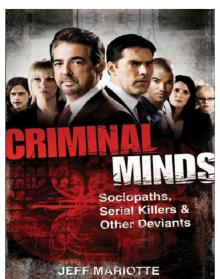 Criminal Minds
Criminal Minds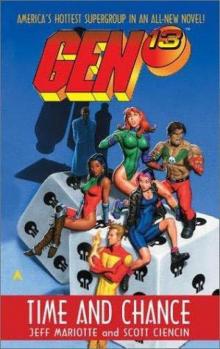 Time and Chance
Time and Chance The Folded World
The Folded World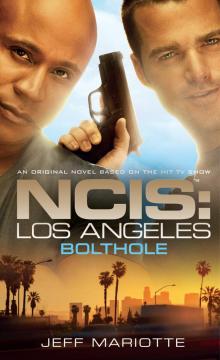 Bolthole
Bolthole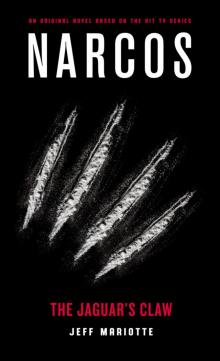 Narcos
Narcos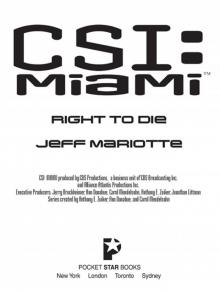 Right to Die
Right to Die